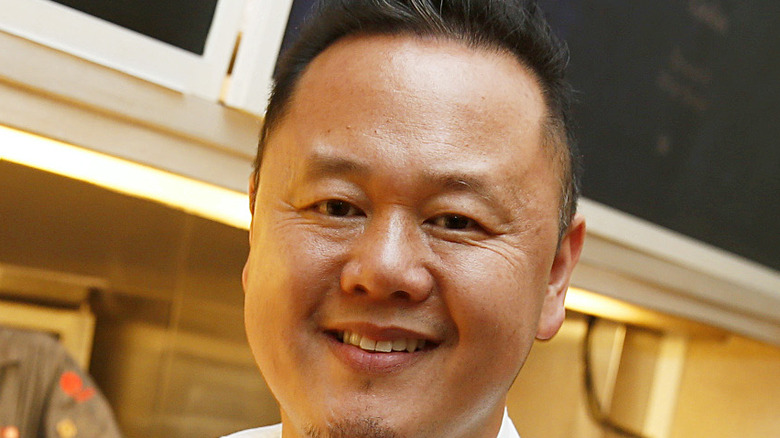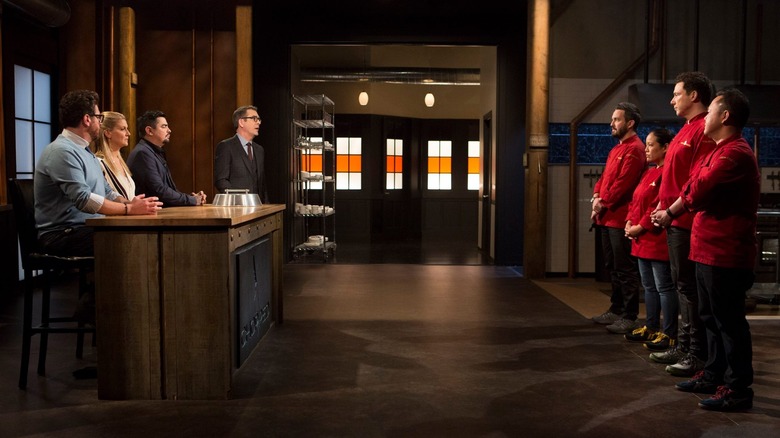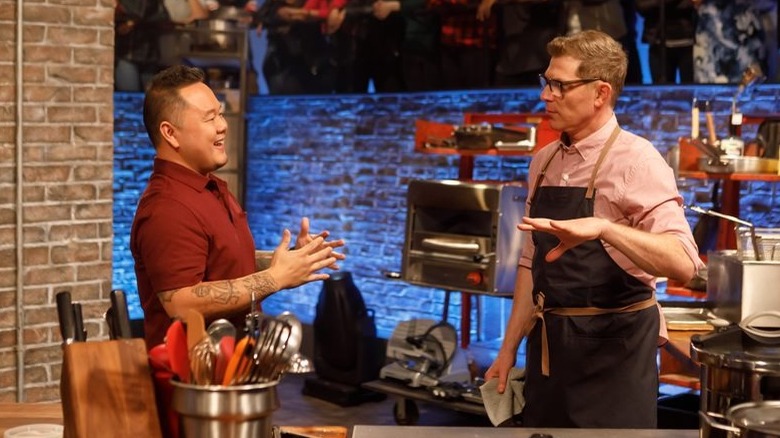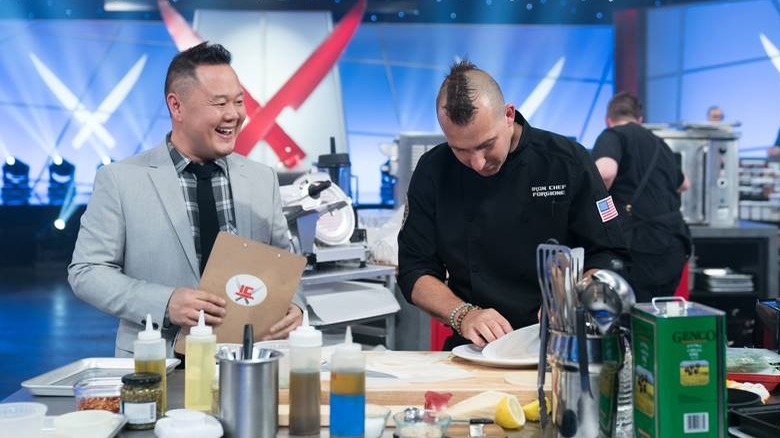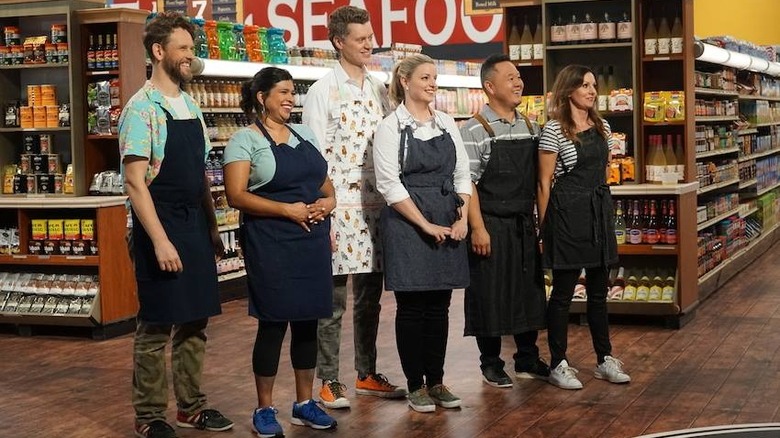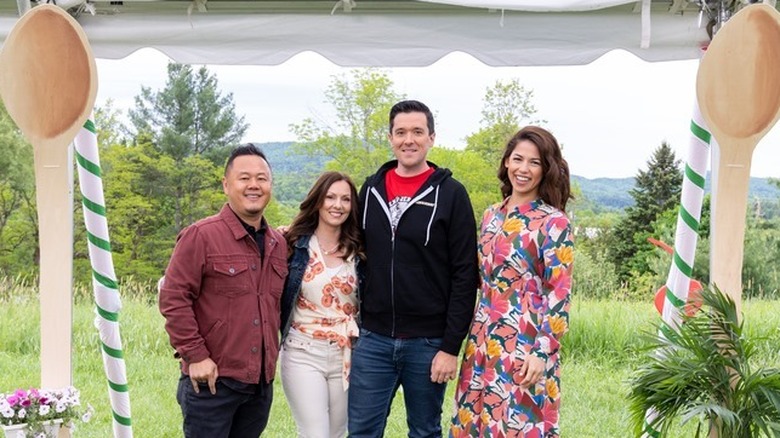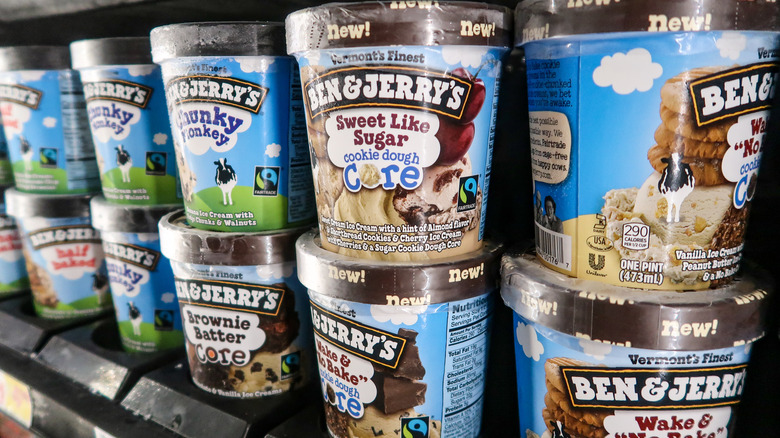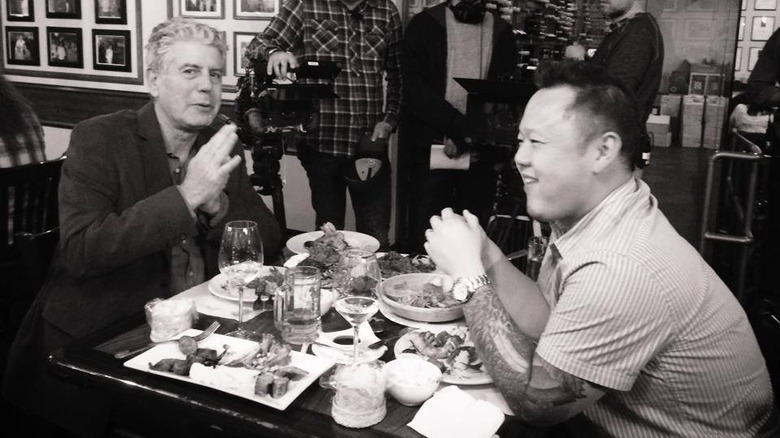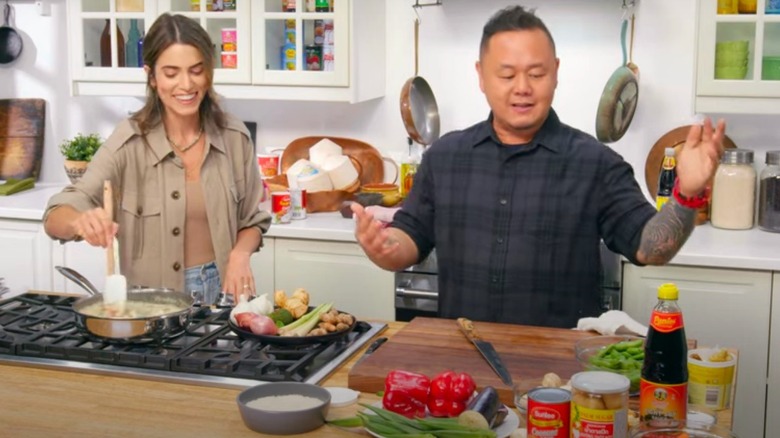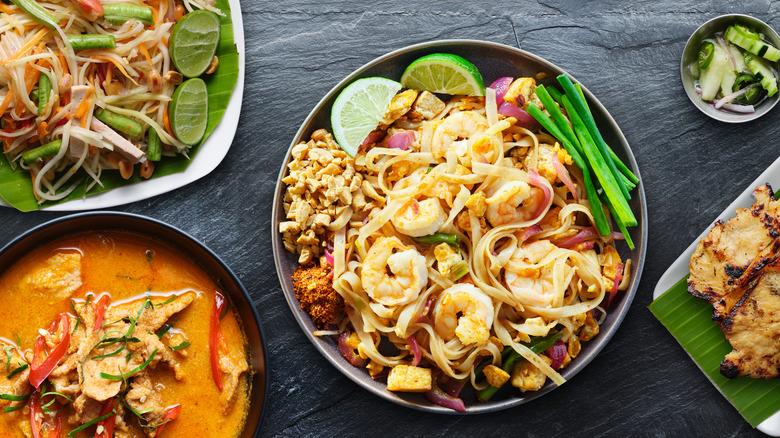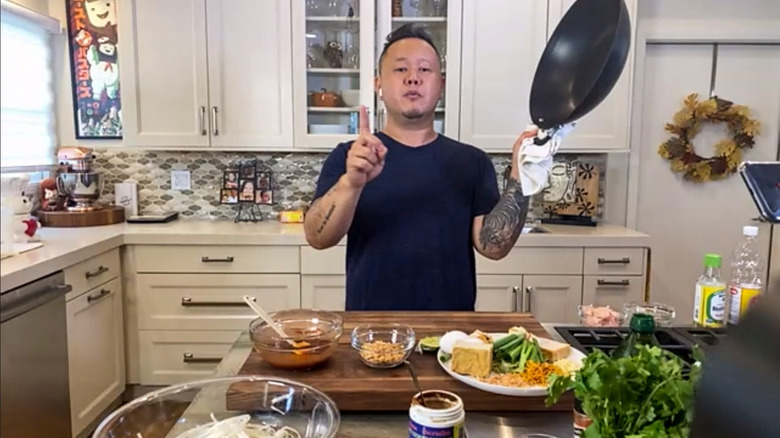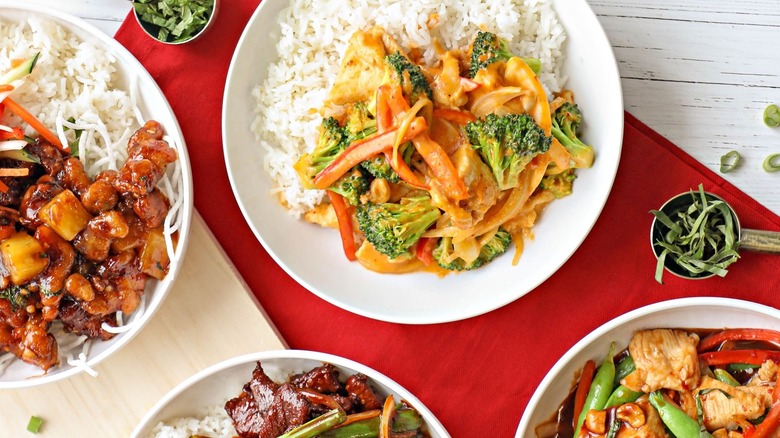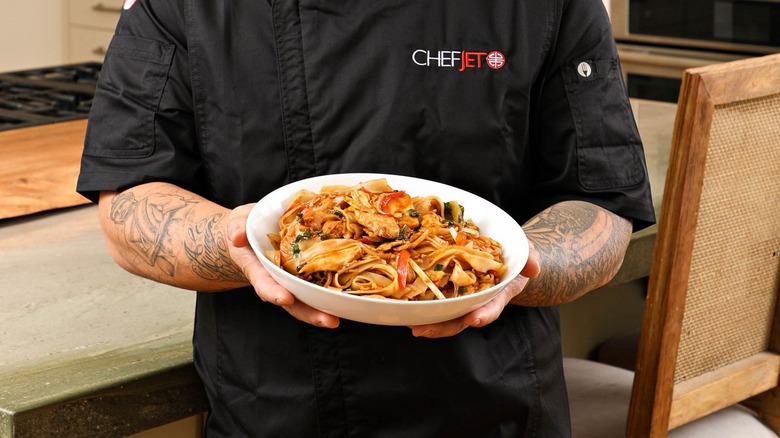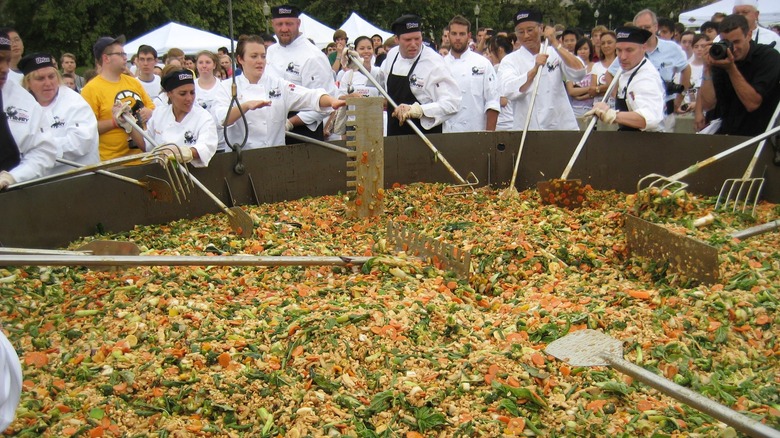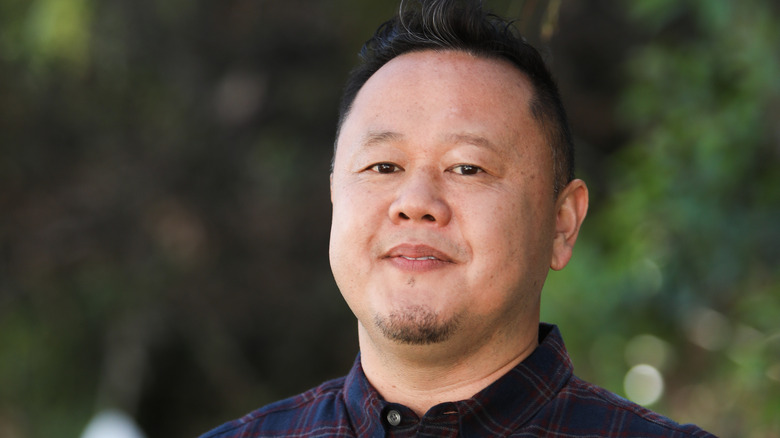Jet Tila Talks Food Network Competition Shows And Thai Food - Exclusive Interview
If you're a regular Food Network watcher, then you've probably seen Jet Tila a time or two. He's made appearances on more than a dozen shows over the last decade, as a guest, a judge, host, mentor, competitor ... you name it, he's probably done it. But Tila is a whole lot more than a Food Network personality. The Thai and Chinese chef calls himself a "culinary storyteller" and has used TV and social media as platforms to elevate Southeast Asian cuisine, and teach people how fun and easy it can be to get out of their comfort zone in the kitchen.
Tila discussed all that and more in an exclusive interview with Mashed, along with sharing behind-the-scenes details from some of your favorite Food Network competition shows, from "Chopped", to "Beat Bobby Flay", to "Iron Chef." Tila also dished on all things Thai food, including his top tips for making it at home.
Jet Tila on why he loves appearing on Chopped
You're all over The Food Network. You've hosted, judged, competed on the full slate of shows. Let's just going to jump right in and start with "Chopped." You've been a guest judge on that show and competed on "Chopped All-Stars." What is the experience like?
I think "Chopped" is one of the most difficult and honest cooking shows out there. I walked in thinking, "All right, look. We're all buds," because I competed on "All-Stars" twice and I've judged a bunch. And I thought, "You know what? They're going to go way easier on us because we're all friends." And it was actually the opposite. They were actually meaner, the baskets were tougher. I've been joking because when you open the baskets up, there's a little black opaque towel on there. And I was pretending I was going to peak, and boom — I got my hands slapped for that.
So I love that show for a lot of reasons. There's a lot of really good programming out there, but I think that show really kind of stays popular because of the level of honesty about it. And I think people appreciate it.
When you're judging, how hard is it actually to decide who we chop?
I think the television audience gets one-20th, maybe one-50th, literally, of the actual deliberation.
Really?
I was just talking to Marc Summers — big name drop, right? But I literally had dinner with him last night. He has a hard time chopping people because he feels bad. I think from a cook's perspective, some of us — myself, Alex [Guarnaschelli], Geoffrey [Zakarian]. who've actually worked in restaurants for 20 years — it's not that hard because people make their own mistakes. And I think as a chef, our job is to not egregiously [say], "Hey, just get the hell out of here. You're chopped." It's more. What [the audience] might not see is, "Hey, this is what you really did wrong." And then, I always take the time to say, "Look, for all these reasons, you're chopped," but then while [the cameras are] rolling and I know they're not going to use it, I'd be like, "This execution or that execution just wasn't right. Do you agree?" And most of the time they'll know. It's not hard for a chef that has done this for a long time, whose job is to mentor and coach. Winners have got to win and unfortunately, people have to go home.
And obviously, as someone who's been on the other side and won "Chopped All-Stars" ... what is the trick to making it all the way?
Man, that win probably was my most intense win on Food Network ... until I win "Tournament of Champions" this next coming year. To beat Rocco DiSpirito, it just blew my mind. So what was it like? It was surreal, unexpected. So going into the deliberation and cooking, just cooking hard. When you're cooking at that caliber, there's just no way to know. So you'll watch the moment where I'm actually in disbelief for about 30 seconds and just not believing what's really happening.
Jet Tila on filming Beat Bobby Flay
Another intense competition show that you've been a judge and a mentor on is "Beat Bobby Flay." You've seen chefs win. You've seen chefs lose. Do you know what it takes to beat Bobby Flay?
The best advice I can give people who are going on to the show, because I've actually competed and judged, is you can't overthink it. Bobby is one of the best chefs alive. And in the first round, you've got to go through your opponent and you have no idea what he's going to pull. And it's going to be something very culinary-focused and it's not going to be easy to cook in 30 minutes.
First, it takes a lot of experience. That's not a show for someone who's maybe cooked for a year or three. You've got to be seasoned. You've got to have a really wide breadth of knowledge and you've got to be quick on your feet. That's what it takes. Fundamentals and quick thinking to try to beat Bobby Flay.
What is the pressure like in that kitchen? What are the cameras not able to capture? Because it's a 30-minute episode and one would imagine it takes much longer than 30 minutes to film.
The camera doesn't capture the accurate fear in competitors. The literal "holy s***, I'm going to try to beat Bobby Flay" moment. And these are seasoned professionals. And it doesn't capture because we have to move so quickly. It doesn't really capture the nuance of frustration. I think Bobby and Food Network ... I don't think we ever smash people and try to keep them down. We really tried to play up their wins, but you don't see the bad decisions that weigh on their faces and how it affects the competitors. I think that would be fun to kind of dig into, just to see more of the frustration, the pain, and the agony.
How long is a day on set when you're filming an episode?
So Bobby is a beast. He does two episodes a day. Full episodes. That means he cooks twice. And then back when we shot in New York, he'd literally hang it up and then go directly to the restaurant and cook dinner service. And so my wife and I did an episode, we co-judged it, and hosted it. And then we had dinner at GATO that night and he cooked for us.
So the actual day ... it's a 9-to-5 day, so it's about eight hours. Two full episodes, plus all the interviews and the posts, and then he's back out in the restaurant by dinner service at 6:00. "Chopped" does a longer day. And "Guy's Grocery Games" and the standard one-hour shows, they're about eight to 10 hours. And the painful part is getting the interviews ... Everyone who cooks has to go through their entire cook with a producer and talk about their cooks so we can get really nice bits of narration.
Jet Tila on facing off in the Iron Chef kitchen
You've also faced off in arguably the most intense competition kitchen out there, which is "Iron Chef America." What is it like to compete and what does it take to win in your mind?
My first time on "Iron Chef" was [nearly] a dozen years ago and I was a full-time cook at that point. Didn't do any television. And I faced the most intense ... I faced [Masaharu] Morimoto on Battle Seaweed and it was, I think, the most intimidated I've ever been.
What's it like and what does it take? A lot of the shows that you're bringing up are really intense cooking shows. And on top of that, you can't forget that you've got 20 cameras on you. We're never acting, but I think it's important to narrate to the audience all the feelings. A lot of chefs are stoic, so they might be feeling angry or excited or mad, but they're never showing it ... I think a good tip for people who are going to do television is let us know what's going on. And I think that's what makes chefs affable and likable because, you know oh my God, at this moment they're in trouble, or they're stoked, or you know what I mean? So on top of just having to cook your ass off, I think it's a nice little layer to kind of let the audience in a little bit on what's going on in your mind.
Do you think it comes more down to just technique or originality at the end of the day?
The shows that you've mentioned take both. It takes perfect technical execution, but it also takes creativity in dishes. Because if you're going to make meatloaf really well, you're probably going to go home. But if you're going to take something and make it something different that's unexpected, that takes another layer of experience and creativity.
Jet Tila says he's determined to win Guy's Grocery Games
You have been both a judge and a competitor on "Guy's Grocery Games." Which one is more fun for you?
I will judge all day long, because for me, "Guy's Grocery Games" is like my kryptonite. I have the longest losing record. I think I'm the most losingest chef on that show. If you took episodes to L's or W's, I probably won two to three times and been on the show 20 times.
That's your redemption story right there.
The game is really difficult because Guy is really good at coming up with games that just make it really difficult. Being a classically trained guy, I fall on certain techniques. And when you take away fresh herbs and you have to go to the freezer, it's really difficult. But I think that's what makes it a really fun game. It makes the audience go, "All right. I'm seeing someone have to deal with what I have to do." A home cook, right? So I love that game because it levels the playing field and it makes home cooks go, "See? It's not that easy coming into my world."
So with a 10 hour day on set, is Guy Fieri just high energy all the time as he seems on TV?
Bobby [Flay], Guy [Fieri], and Giada [De Laurentiis], they're the best for many, many reasons, but that's one of them. Guy is not just hosting. He's producing in the moment. I don't think there's anyone better at just understanding where the cameras are, the beats to hit, and then grabbing reactions [from] three judges, four contestants, and just running the show. He has the mind of a conductor ... He's literally producing on the fly and still getting one and a half episodes out a day sometimes. And sometimes two. It's pretty unbelievable.
Jet Tila discusses the best part of filming Ben & Jerry's: Clash of the Cones
Let's talk about one of your newer projects you're working on. You are a judge on "Ben and Jerry's: Clash of the Cones." So what is this experience like for you, kind of getting on the sweet side of things?
Yeah, that was a big fish out of water moment. So my wife [Ali Tila] was a preschool special-ed teacher for 15 years and then went to culinary pastry school, and then went head-on and cooked for some really great people.
Was that before she met you or did you get her into food?
We married and I was like, "If you don't want to teach anymore, I'll send you to pastry school to pursue your dreams." She loves to cook. I mean, she loves to cook more than I do ... I actually knew the least about pastry, but probably the most about food competition and what the contestants are going through. So I thank the powers that be for casting me because I wasn't the pastry guy, but I think I did bring something to it. So "Clash of the Cones" was really fun. And it was just a proud moment to watch my wife shine.
We've been married 10 years and she has been cooking pretty full-time seriously for five or six years now. And just to watch her own the moment. And then Chris, the ice cream guru ... I basically got paid to give commentary and just learn stuff. I mean, I don't know ice cream well. I don't know all the things it takes to make really great desserts. So it was a fantastic opportunity just to be there and be proud of [my] wife, learn about stuff, and learn about ice cream, and see how a sweets show goes because I've never done a sweets series.
Jet Tila shares what he learned while filming Clash of the Cones
We heard it was filmed in an ice cream lab that Ben and Jerry's constructed.
So Ben & Jerry's, their main headquarters is in Vermont. It's just gorgeous. Adjacent to the plant where they actually make ice cream, [they] have a retail scoop shop and a store. They have this gorgeous six, seven, eight acres. And then they also have an ice cream graveyard. Have you ever had a flavor that you liked and they retired? They literally put it in the graveyard.
What is the coolest thing you've learned about ice cream while you did the show?
I'm going to geek out for a minute and it might not be fun to print. Most ice creams are custard, right? Eggs, sugar, and milk, right? Or cream? The amount of air one needs plays to how creamy it is and how fast or slow it melts. I learned what overrun means, which means how much air is in an ice cream. I learned how difficult it was for these six contestants to make phenomenal ice creams and mix-ins. And some of them baked cookies and made chocolates and nuts and coated nuts. So I have a new appreciation for how hard pastry is.
If you could create your own dream Ben and Jerry's flavor, what would it be?
Wow. It would be called Boring Jet because when it comes to ice cream, I'm straight down. I want maybe a vanilla coffee swirl. I want a combination of toffee chips and maybe chocolate covered almonds. So, wow. I think we just came up with a new flavor.
Jet Tila shares one of his favorite memories of Anthony Bourdain
A couple of years ago, you got a chance to film a "Parts Unknown" episode in Las Vegas with Anthony Bourdain. What it was like to work with him and are there any particular memories you can share with us?
I worked with Tony twice. What can I say that hasn't been said about him? I'm in Austin, Texas, and I got a call from his people and he's like, "Bro, we're going to do Lotus. You're the perfect person to take us to Lotus. Can you do it?" And I was on a three to four-day trip away from home. My wife's watching two little kids on her own. She's cool, and she's like, "It's Tony. You got to go."
I get to Vegas. I walk into Lotus and he's there. He has this ability to make it to where there's 300 people around us and everyone's clamoring for his attention, but he and I are just having an intimate conversation and he's like, "Hey, what's going on, bro?" Real talk. And I'm like, "Yo, man. I love you. You're the man. We haven't seen each other in a long time, but my wife's going to kick my ass because I haven't been home." He's like, "Give me your phone." And I'm like, "Okay." He sends a personal message to Ali and goes, "Ali, thanks for lending me Jet. I really needed him."
And you don't think a few years later, he's going to be gone. So to have that little piece of real Tony, intimate Tony, it gives me those feelings. You know what I mean? So that epitomizes who he is, as big as his world was.
Thanks for sharing that story.
Of course. There's one Bourdain. There will only ever be one.
Absolutely. And you're not the first person we've gotten the chance to ask that question to, and it feels like every single person ... they have some kind of nugget like that — of just that personal moment that he just kind of shrinks the world down right there for you.
Yeah. And just the life that I've lived to have time with Tony and Alton [Brown] and Bobby [Flay] and Guy [Fieri], and intimate time. Just to see these people in real life and to have those moments. Yeah. I don't know what I did in a past life, but I feel really grateful every single day. It's insane.
Jet Tila dishes on his new YouTube show and what it means to be the Culinary Ambassador for Thailand
You launched a YouTube series earlier this year, "Thai Food at Home with Jet Tila." You're getting together with other celebrities and showing off some of the best Thai food and ingredients. How did this show come about and what do you hope people learn from it?
So part of my job is the Culinary Ambassador for Thailand, right? I literally work for the government and my job is to promote Thai food and the history of Thai ingredients and stuff in America. So I basically pitched to the government, "I'd like to do more of an intimate one-on-one show." And I don't really have a big YouTube presence, right? It wasn't really my thing, but I thought it would be a fun platform because it didn't have to have a lot of sponsors and it didn't have to fit into certain buckets. So that was it. I literally wanted to have one-on-one time with other celebrities I knew or didn't know that had a genuine thirst for wanting to learn Thai food.
We kind of threw a bunch of names on the board and that's how that show started. If you watch it, it's a very fun and informative, intimate kind of a cooking class in a pandemic where you couldn't hang out with people. While we were locked down for a year and a half. We all were used to doing Zoom. So I thought it actually became pretty fun. I just want people to take away getting to know me and my guests and understanding a dish really well.
Obviously, you have the official title, as Thai Culinary Ambassador. But have you sort of always considered yourself to be an ambassador of Thai food in the U.S.?
Yeah. I was lucky enough to be born into the first Thai food family in America. It blows my mind to think there were literally no Thai restaurants or markets before my family started the first ones. So yeah, my dad started this little grocery store called Bangkok Market in 1972 in Hollywood LA here. And then we started Royal Thai Cuisine and I got to see Thai food really flourish. So my family had the privilege and honor to be the first Thai food teachers. It wasn't my goal. My first passion is family, right? My wife and kids, and my second passion is teaching and teaching Thai food. So this gives me a platform to teach about my culture and different cultures. And so, yeah. I think I've been an unofficial ambassador for 40 years. And then for the last six years, I've been the official culinary ambassador.
Jet Tila muses on the growing popularity of Thai food
Thai food and Thai ingredients are getting more and more popular in the U.S., especially in recent years. What do you think is driving that?
I think there's two things. I think there's a very organic lovability about Thai flavors, right? We know Chinese food, we know Japanese food, and they have very specific rules to them. I think Thai food, unlike other Southeast Asian [cuisines], has the sweet and the salty and the spicy so in concert or in harmony, I think Thai food is naturally very different and it's very different from Vietnamese food, who's our cousin. So there's something about just the way Thai [food blends] hot, sour, salty, sweet, savory, that can hit most palettes.
And then we're also one of the cultures that encourages you to play with food. I have a Chinese grandmother and a Thai grandmother. If my Chinese grandmother served you a dish and you put soy sauce on it, she would chop your hand off, right? You're not allowed. This is how it's supposed to be. My Thai grandmother would be like, "Here's a dish. Here's a little fish sauce. Here's a little sugar. Here's a little chili. Play with it, enjoy it, make it how you want it."
And the honest truth is too, [within] the Thai government there's a concerted effort to promote Thai food around the world. And that's why there's a culinary ambassador and that's why we have projects globally to expose people to Thai food and help Thai entrepreneurs around the world open restaurants and markets and do promotions. So it's a two-pronged kind of situation.
Jet Tila's tips for making Thai food at home
So for home chefs who want to try their hand at some traditional Thai dishes, what do you suggest they start with?
If you like Thai curry, I would make a curry. Because in a can of curry there's lemongrass and galangal and kaffir lime. There's basically instant Thai credibility. Marry it with a can of coconut milk. Add your favorite protein. Add your favorite vegetables ... And then after that, a young jackfruit salad. After that, go to Pad Thai, go to drunken noodles. And watch one of my videos. They're free ... We've intentionally put out materials to help everyone around the world cook Thai food and love Thai food.
Now the Pad Thai that we're accustomed to in the U.S., how is that different than authentic Thai food.
Man, I'm more like, the whole "A word" has become a very contentious word, authenticity. I will tell you as an American-born Thai Chinese kid, there are Thai people who love sweet Pad Thai. So I don't buy it. I think the main differences are that Thai food in Thailand is a way more spicy. It's like taking the dials, like an EQ, and just ramping them up. More sour, more spicy. But I think that Thai food in America, there are places that are just as good as Thailand and I'll fall on the sword for that. So that might've been true in the '70s and '80s,
For home chefs who want to start cooking Thai food, what are some of the must-have ingredients they need to have in their kitchen?
So Thai fish sauce, right? It's specifically Thai fish sauce. Coconut milk. You're going to want to have curry paste. So chili paste, and soybean oil ... lime, chilis. And my next book, basically, I cover it really deeply in a pantry section. But [with] six to eight ingredients, and you could basically make 20 different dishes easy. It's not a difficult pantry, and it's about trusting your palette.
In Thai, we have a word called "yam" and I know it's the same as yummy ... It's that perfect balance point between hot, sour, salty, sweet, savory. So lime juice is sour. Chilis, they're hot. Sugar is sweet. Fish sauce is salt. And basically, just in those four ingredients, you're starting your journey into those Thai flavors.
Jet Tila discusses his fast casual restaurant ventures
You teamed up with Pei Wei last year to create some signature menu items. Can you talk about the inspiration behind some of those dishes?
Pei Wei, as a lot of people know, was originally started by PF Chang's many, many, many, many years ago, bought and sold twice. My team acquired it two years ago. And the whole idea was to blow it out and meet America's expectations. I think people are ready to move way beyond chow mein and orange chicken. So the goal for Pei Wei is to make it a Pan-Asian fast casual restaurant. So that's why you've got Thai curry now. I added Curry. I added gochujang, which is Korean. And I added drunken noodles immediately.
So those are my first three hitters where I'm bringing Thai food and bringing Korean flavors in. And then as we go, we're going to go Vietnamese, and then we're going to get deeper. But we're not going to try to do everything perfectly. It's never going to be a pho restaurant. All right? It's going to be stir fry-based, quick. You should be able to be in and out within a few minutes and it should taste authentic. So the whole goal is to go from a Chinese fast casual to a Pan-Asian fast casual all across the country.
You're very much in the fast casual game now, because you also have Dragon Tiger Noodle in Las Vegas.
For two reasons primarily. One is, I'm 46. My family had something like 12 mom and pop businesses at one point, and we never saw each other. They grew up never really getting along. It was fun and amazing, but it wasn't familial. At this phase of my life, fast casual fascinates me because I can feed a lot of people in a day and it's not fussy. That's how most people want to eat. And as an entrepreneur too, I know that's the only way I'm going to be able to kind of retire in a few years. So it hits all my needs. I get to see my family. I'm talking to you from home. I get to see my kids after this. I'm going to make dinner. So it really suits my wants and needs.
Prestige is nice, but it's not my goal. Television was a vehicle to communicate with people, to have a presence. But fast casual as an entrepreneur, it fascinates me and that's the reason I'm going into a noodle shop, which is Dragon Tiger Noodle. And that's why we're going into more of a wok shop, which is Pei Wei. So they're two different worlds.
What would you say is the first thing a new visitor to Dragon Tiger Noodle should try?
I want you to try our homemade ramen noodles because we make 80% of the noodles in-house, right? I've brought in a $30,000 noodle machine from Japan in each location. So we're making udon, we're making a ramen and soon we'll be making soba. And we make all our broths in-house and we created this technology where we actually have tapped 205 degree broths. I've got a Japanese tonkotsu broth, which is a rich pork broth. I've got a Thai broth. I've got my grandmother's Chinese chicken soup broth. So I want you to go in and try the ramen noodles with pork belly. And if you want something a little different, I want you to try my vegan hot Thai Yum, my Thai broth with the rice noodles.
Jet Tila explains the story behind his Famous Drunken Noodles
You mentioned some drunken noodles earlier. Can you tell us what makes your version so famous?
Drunken noodles are like Pad Thai. It's a street food noodle dish, right? When I was in Vegas, having a Chinese grandmother and a Thai grandmother, I basically brought those two worlds together. I made my drunken noodles more rich, a little more spicy, gave it some interest.
And so Giada De Laurentiis was exploring opening a restaurant in Vegas [around] 2010. And now, of course, we all know the restaurant that's very successful. We became good friends, and I was trying to be her fixer, "What do you need, Giada? ... You're going to meet this guy and meet that guy." And she says, "Hey, we're doing this show called "Best Thing I Ever Ate" and we're doing a noodle episode. And your drunken noodles are so out of control. I want to feature them." And it was just a dish on the menu. It wasn't meant to be anything. But once Giada put the drunken noodles on "The Best Thing I Ever Ate" it blew up. It exploded. So that's the backstory. My drunken noodles are a Chinese hybrid to Thai drunken noodles, and that's what makes them different.
Jet Tila dishes on the story of his world record-breaking stir fry
You hold the Guinness world record for the largest stir fry. Can you tell us a little more about how that all happened?
I have six culinary world records right now. So stir fry, I broke twice. So the first time ... in 2000 and 2001, Thai Town was just being recognized in Hollywood. I was part of the group that kind of helped launch Thai Town and I wanted to do the world's largest Pad Thai. I went for 400 pounds of Pad Thai. I submitted it to Guinness, they kicked it back and said, "No, you don't get the world record because it's technically a stir fry." So I basically got pissed. I was like, "All right, screw it. What's the biggest stir fry? I'm going to break the biggest stir fry." So it was 800 pounds at that point. So during the planning of 800 pounds ... someone broke the 800-pound record. So I had to scramble and I had to do it at 1,100 pounds the first time. Someone came back and broke that record and we did 4,000 pounds the second time.
How long did that take?
To break a culinary world record, everything has to be cooked and prepped as it would be for one dish. So you had to take all the protein, all the vegetables, make all the sauce, and I had to design a wok big enough. It took about two hours. So I did it at the University of Massachusetts in Amherst. My buddy is the director there. So every world record we've ever broken, we immediately had a place to feed the kids. It was always around an opening or a school event and it always had a charitable component ... Food waste was top of mind, so every record I broke in, the food was demolished within an hour.
Jet Tila on being a culinary storyteller
You've got a seriously wide-ranging and highly acclaimed culinary career. Where do you find the most joy on the job?
That's changed from my twenties to thirties to forties. And I would say the one consistent through-line in these two, three decades that I've been cooking has been being able to share knowledge whilst getting feedback. So when I get the email like, "Hey, man. My mom taught me how to cook this dish," or, "I taught someone to cook this dish," or "Thanks for what you do," I really get the most satisfaction from teaching. From being able to share knowledge, share a technique, and getting that feedback. So that's what is great about television and social media. I think people might say I'm a celebrity chef, but I just think I'm a cooking teacher and an entertainer. So I feel really grateful to have had that opportunity to basically connect with people through food.
Even on your website how it basically says that you're above all a culinary storyteller.
That's it. That is really my goal. I came from these very rich cultures and I've had a platform and I've also had a lot of mentors that have taught me how to use this platform. Again, I don't know how it all happened, man. Knock on wood. It's been a hell of a ride. It's still early and we'll see where it goes.
Are there any other new projects coming up that you can or want to share with our readers?
I just delivered the next cookbook, "101 Thai Dishes You Need To Cook." Guy Fieri wrote the forward. That will be [coming out] Lunar New Year, so January 25th next year. There's a few TV shows that are coming out soon, too. Check out Pei Wei. Check out Dragon Tiger Noodle.
You can catch Jet Tila on his YouTube channel and on Food Network. And keep an eye out for his newest cookbook, on sale in January 2022.
